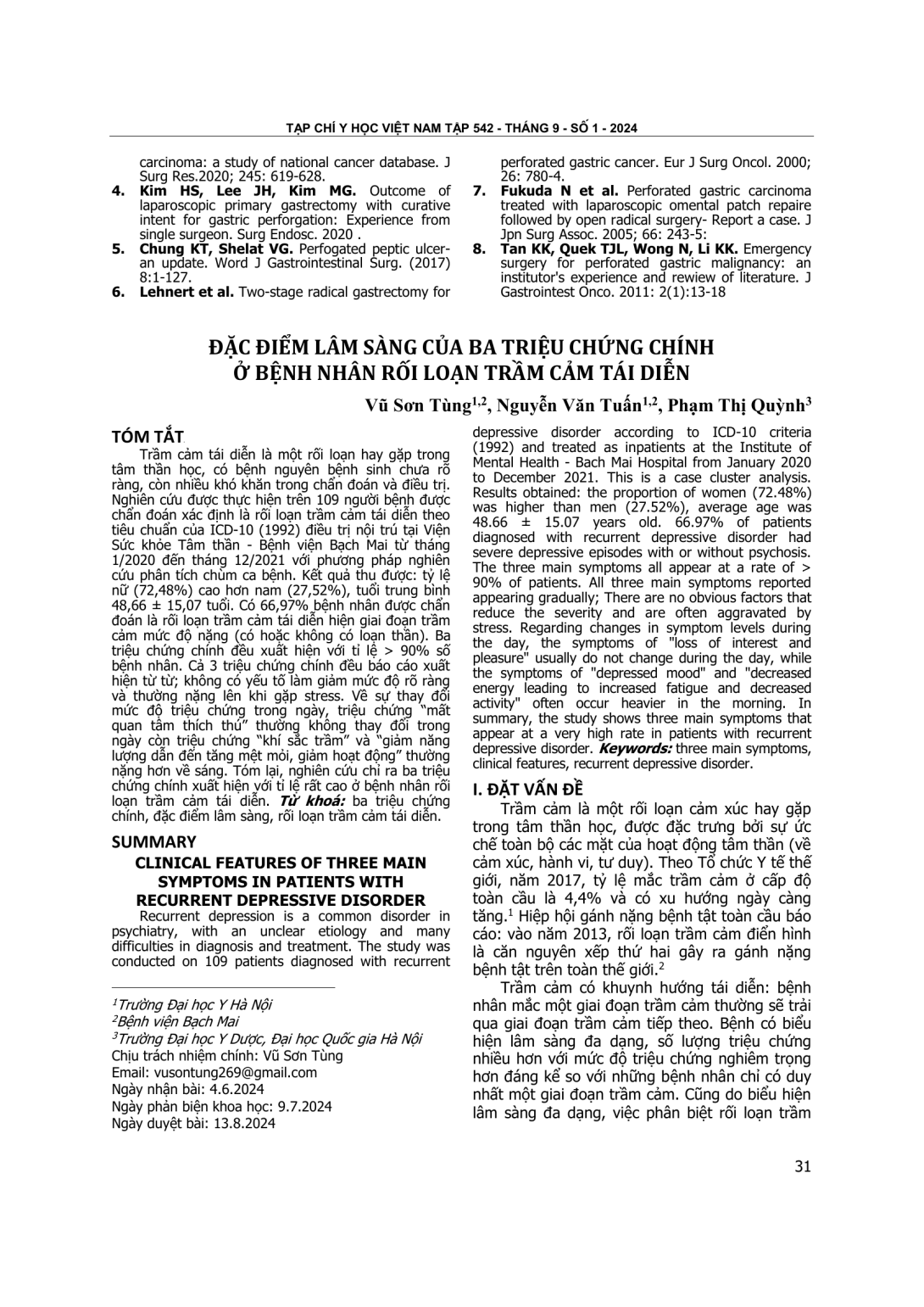
Trầm cảm tái diễn là một rối loạn hay gặp trong tâm thần học, có bệnh nguyên bệnh sinh chưa rõ ràng, còn nhiều khó khăn trong chẩn đoán và điều trị. Nghiên cứu được thực hiện trên 109 người bệnh được chẩn đoán xác định là rối loạn trầm cảm tái diễn theo tiêu chuẩn của ICD-10 (1992) điều trị nội trú tại Viện Sức khỏe Tâm thần - Bệnh viện Bạch Mai từ tháng 1/2020 đến tháng 12/2021 với phương pháp nghiên cứu phân tích chùm ca bệnh. Kết quả thu được: tỷ lệ nữ (72,48%) cao hơn nam (27,52%), tuổi trung bình 48,66 ± 15,07 tuổi. Có 66,97% bệnh nhân được chẩn đoán là rối loạn trầm cảm tái diễn hiện giai đoạn trầm cảm mức độ nặng (có hoặc không có loạn thần). Ba triệu chứng chính đều xuất hiện với tỉ lệ > 90% số bệnh nhân. Cả 3 triệu chứng chính đều báo cáo xuất hiện từ từ; không có yếu tố làm giảm mức độ rõ ràng và thường nặng lên khi gặp stress. Về sự thay đổi mức độ triệu chứng trong ngày, triệu chứng “mất quan tâm thích thú” thường không thay đổi trong ngày còn triệu chứng “khí sắc trầm” và “giảm năng lượng dẫn đến tăng mệt mỏi, giảm hoạt động” thường nặng hơn về sáng. Tóm lại, nghiên cứu chỉ ra ba triệu chứng chính xuất hiện với tỉ lệ rất cao ở bệnh nhân rối loạn trầm cảm tái diễn.
Recurrent depression is a common disorder in psychiatry, with an unclear etiology and many difficulties in diagnosis and treatment. The study was conducted on 109 patients diagnosed with recurrent depressive disorder according to ICD-10 criteria (1992) and treated as inpatients at the Institute of Mental Health - Bach Mai Hospital from January 2020 to December 2021. This is a case cluster analysis. Results obtained: the proportion of women (72.48%) was higher than men (27.52%), average age was 48.66 ± 15.07 years old. 66.97% of patients diagnosed with recurrent depressive disorder had severe depressive episodes with or without psychosis. The three main symptoms all appear at a rate of > 90% of patients. All three main symptoms reported appearing gradually; There are no obvious factors that reduce the severity and are often aggravated by stress. Regarding changes in symptom levels during the day, the symptoms of "loss of interest and pleasure" usually do not change during the day, while the symptoms of "depressed mood" and "decreased energy leading to increased fatigue and decreased activity" often occur heavier in the morning. In summary, the study shows three main symptoms that appear at a very high rate in patients with recurrent depressive disorder.
- Đăng nhập để gửi ý kiến
